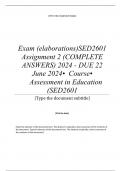[TYPE THE COMPANY NAME]
Exam (elaborations)SED2601
Assignment 2 (COMPLETE
ANSWERS) 2024 - DUE 22
June 2024• Course•
Assessment in Education
(SED2601
[Type the document subtitle]
[Pick the date]
[Type the abstract of the document here. The abstract is typically a short summary of the contents of
the document. Type the abstract of the document here. The abstract is typically a short summary of
the contents of the document.]
, Exam (elaborations)
SED2601 Assignment 2 (COMPLETE ANSWERS) 2024 -
DUE 22 June 2024
Course
Assessment in Education (SED2601)
Institution
University Of South Africa (Unisa)
Book
Sociology of Education
SED2601 Assignment 2 (COMPLETE ANSWERS) 2024 - DUE 22 June 2024
100% TRUSTED workings, explanations and solutions.
Question 1 1.1 Discuss what is meant by “sociology”. (3)
Sociology is the systematic study of human society and social behavior. It involves examining
various aspects of society, such as social institutions, organizations, cultures, and interactions
among individuals and groups. Sociology seeks to understand how society functions, the patterns
of social relationships, and the factors that influence human behavior within social contexts. It
explores topics such as social inequality, social change, culture, norms, values, and the impact of
social forces on individuals and communities.
1.2 Define the concept of education. (3)
Education is a process of acquiring knowledge, skills, values, beliefs, and habits through
teaching, learning, or training. It involves the systematic imparting and receiving of information,
ideas, and concepts, typically in formal institutions such as schools, colleges, and universities.
Education encompasses both formal instruction and informal learning experiences, with the goal
of developing individuals intellectually, socially, emotionally, and morally to enable them to
participate effectively in society.
1.3 Briefly explain the following terms: a) Assimilation (1) Assimilation
refers to the process by which individuals or groups adopt the
culture, customs, and values of another group or society, often
, resulting in the blending or integration of different cultural elements
into a unified whole. It involves the absorption and incorporation of
new cultural practices and norms into one's own identity or way of
life.
b) Society (1)
Society refers to a group of individuals who share a common culture, territory, and social
structure, and who interact with one another within a structured framework of norms, values, and
institutions. It encompasses both formal and informal relationships among people living together
in a specific geographic area or sharing common interests or characteristics. Society provides the
context within which individuals develop their identities, relationships, and roles, and it shapes
their behaviors, beliefs, and experiences through various social processes and interactions.
c) of Ecology a school (1)
Ecology is the scientific study of interactions among organisms and their environment, including
other organisms. In the context of a school, ecological principles can refer to understanding the
relationships between students, teachers, administrators, and the physical environment of the
school. This includes how individuals interact with one another within the school community and
how they are influenced by factors such as classroom dynamics, school policies, and the overall
school environment.
1.4 One of the functions of the sociology of education is the activation of
constructive and creative forces. How could this aim be taught in the
classroom? (6)
Teaching the aim of activating constructive and creative forces in the
classroom through the sociology of education involves several strategies:




